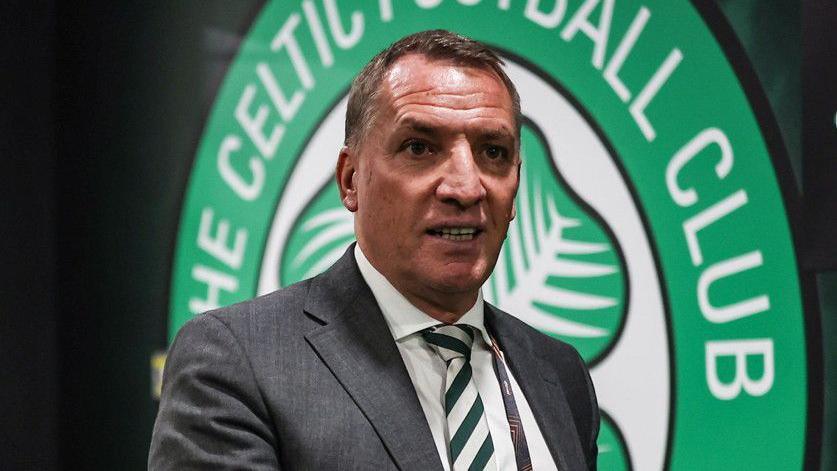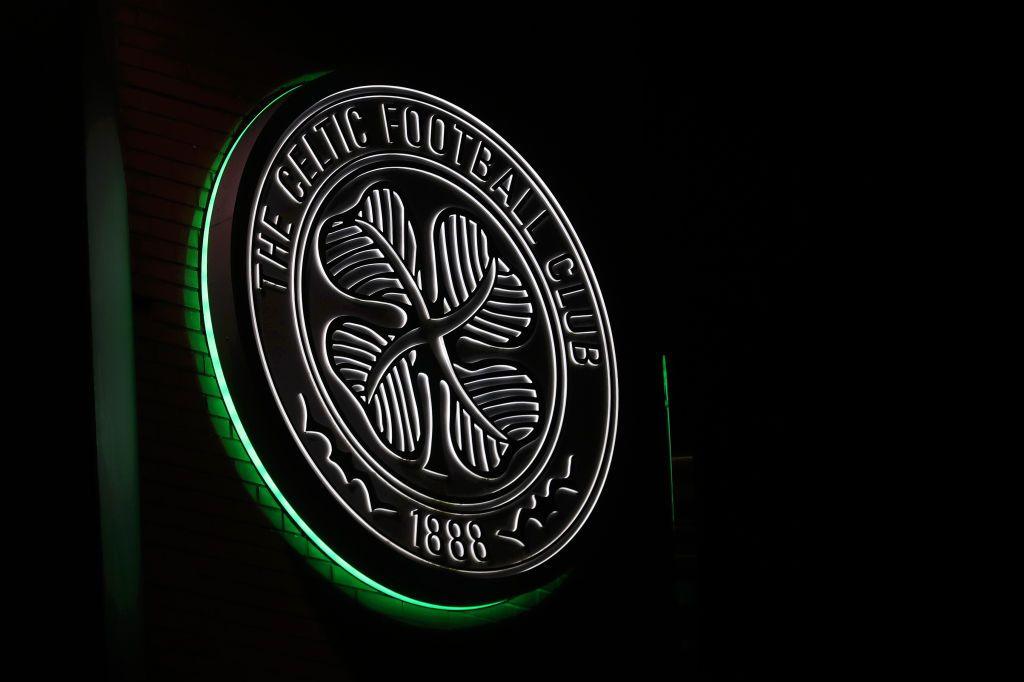Rodgers v Desmond: Analysing the Celtic fallout

- Published
At first, the farewell - and then the filleting.
Monday night brought two statements from Celtic Park, one from the club announcing that Brendan Rodgers had resigned, the other from major shareholder Dermot Desmond excoriating the now ex-manager in the most incendiary fashion.
There are two sides to every story - and so we wait for Rodgers' version.
In the meantime, it's worth a close examination of the precise words that came out of Celtic on Monday and how they sat with what we knew or what we thought we knew.
"Celtic Football Club can confirm that football manager Brendan Rodgers has today tendered his resignation."
Nobody really expected Brendan Rodgers to be at Celtic next season, but equally nobody thought that he was about to resign. During the week, he said he "was never more motivated in my time at Celtic."
In the wake of the 3-1 loss to Hearts on Sunday he said: "I've never worked harder in all my time here. So the motivation is there to try and flip the levels that we're at. It's absolutely fine, it's still so early. I think that's the key point in it all. We've just got to hang in there at this moment, find those performances, find the results and hopefully our levels will improve as the season goes on."
Just over 24 hours later he was gone. It begs the question - the first of many - what changed? The rest of these quotes are drawn from Desmond's own statement.
"In June, both Michael Nicholson and I (Dermot Desmond) expressed to Brendan that we were keen to offer him a contract extension, to reaffirm the club's full backing and long-term commitment to him. He said he would need to think about it and revert. Yet in subsequent press conferences, Brendan implied that the club had made no commitment to offer him a contract. That was simply untrue."
All of this is open to interpretation. Only those in the room know exactly what was said, but we can analyse Rodgers' version from closer to the time. In August he said all three parties had a conversation "on where we were at and where it sits with myself and everything else and I said I'm very happy here."
Rodgers pointed out to the media that "when the club feels there's that time to make an offer then they will do." In September, Rodgers said that hadn't "had an offer yet to think over and until that comes I am not going to be so arrogant to say I want to be here for another three years. The club might not want me here. I have to respect that. Until there's something serious on a piece of paper, I continue to do my job."
Desmond is entitled to ask why Rodgers was publicly saying "the club might not want me here" when, as Desmond claims, Rodgers had already been told in June that he was wanted. But was he actually made an offer to stay? Desmond states a keenness to offer a contract extension but stops short of saying that he actually put anything on the table. There's a bit of dancing on the head of a pin about this.
"Every player signed and every player sold during his tenure was done so with Brendan's full knowledge, approval, and endorsement. Any insinuation otherwise is absolutely false."
The "insinuation" came during the summer when two players in particular, the striker Shin Yamada and the defender Hayato Inamura, were brought in. Rodgers referred to them as "club signings".
Rodgers did not say this explicitly but people took from his comments that those arrivals were not sanctioned by him. The former manager might dispute the interpretation, of course, but clearly this is how Desmond also interpreted it.
The inference that players were being signed without his support caused disquiet behind the scenes and suspicion and rancour among the fans. It was the beginning - or the continuation - of the breakdown in trust between the board and Rodgers.
Last month, an amalgam of Celtic fans' groups called the Celtic Fan Collective had a meeting with some key people at the club and they asked if Rodgers had the final say on all players. Chief executive Michael Nicholson said he had.
Why then did Rodgers refer to "club signings", Nicholson was asked. In reply, Nicholson shrugged his shoulders. No words, but a further indication that all was far from well.
Later, a statement came out of Celtic and reading it now it takes on a different hue. "...much of what is written in the media or online about our transfer dealings is inaccurate," it read.
It went on: "We also understand that this leads to frustration among supporters. While we cannot comment during ongoing negotiations, we are exploring ways to seek to address the gap between speculation and reality once each transfer window closes, in order to improve clarity for our supporters."
Did Desmond hold Rodgers partially responsible for inaccurate information in the media and subsequent fan frustration? It would appear so. Rodgers has yet to address this.
"His (Rodgers') later public statements about transfers and club operations came entirely out of the blue."
This is a curious one because Rodgers had been going on about transfers and club operations for the longest time. It didn't just start this summer, it was a regular theme before that - and a theme of Ange Postecoglou's and Neil Lennon's before him. Out of the blue? Not really.
I'm just keeping Celtic seat warm - O'Neill
- Published28 October
"Regrettably, his words and actions since then have been divisive, misleading, and self-serving. They have contributed to a toxic atmosphere around the club and fuelled hostility towards members of the executive team and the Board. Some of the abuse directed at them, and at their families, has been entirely unwarranted and unacceptable."
A hugely serious charge. There's no doubt that a toxic atmosphere has set in at Celtic but for Desmond not to accept the board's own role in that is quite something.
If Rodgers contributed to it, in his view, then so, too, did the club's poor recruitment and their inability to properly replace stellar players.
Many fans' groups feel that they are not being listened to and that the club is going backwards, a feeling that has driven the fans to the point of mutiny. The creation of hostility cannot be placed solely at the door of the former manager.
"What has failed recently was not due to our structure or model, but one individual's desire for self-preservation at the expense of others."
From Desmond there doesn't appear to be any acceptance of responsibility for what has gone wrong at the club lately.
Celtic's model has served them extremely well over the years, but most recently it's faltered badly. Substandard players have been recruited and are not mapped at Celtic Park these days. There's plenty of blame to go around on that score.
Kyogo Furuhashi, Matt O'Riley, Liel Abada and Nicolas Kuhn were X-factor operators for the club, but they don't have that kind of quality anymore.
They've spent plenty of money, but have they spent it wisely? If not, is that not an indictment of the Celtic model and execution?
Accusing Rodgers of self-preservation doesn't address the fact that Celtic's team lacks so many things that it once had. The blame is not a one-way street.
"We all share the same ambition: to ensure Celtic's continued success domestically and to achieve further progress in Europe."
There's no doubt that Celtic is full of people who want the best for the club, but Desmond's line about "further progress in Europe" is highly debatable.
They've just been knocked out of the Champions League by Kairat Almaty, they have regularly failed, under several different managers, to make the old group stages, losing to teams with smaller budgets.
In the last 10 years they have won 41% of all European games and have lost 45%.
The four biggest defeats in their European history have all come in the last decade. "Further progress" is a stretch when your city rivals have made two European finals since Celtic last appeared in one.
"Celtic is greater than any one person"
When Rodgers replies it will be interesting to see if he makes anything of this.
Celtic fans, in great numbers, will tell you that Desmond has too great a say in the running of the club, that he has become too powerful.
The fact that it wasn't the club chairman or chief executive or the board as a united force that delivered that thunderclap to Rogers on Monday evening, but Desmond, the major shareholder but a non-executive at Celtic, is, perhaps, indicative of the club not being greater than any one person.
A moot point, like so many in this tortuous saga.
Related topics
- Published18 June 2023

